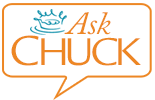How to Use My Tax Refund to Get Out of Debt
 To learn Biblical answers to your financial questions, you can #AskChuck @AskCrown your questions by clicking here. Questions used may be lightly edited for length or clarity.
To learn Biblical answers to your financial questions, you can #AskChuck @AskCrown your questions by clicking here. Questions used may be lightly edited for length or clarity.
Dear Chuck,
We need help prioritizing how to use our tax refund. We are expecting to receive about $3,100 from our refund and want to use it wisely since we have a little over $23,000 of debt and are in desperate need of new tires for my car ($450). In what order should we use the refund money to do the following: put $1,000 into an emergency savings account, pay off credit card debt, pay off student debt, pay off car loan, pay off a medical bill, or purchase new tires?
Overwhelmed with Debt

Dear Overwhelmed with Debt,
While I am sorry that you are feeling overwhelmed, the fact that you are getting a refund and want to spend it wisely is encouraging!
It would be helpful to have more information, especially about your income, assets and details about each of these debts. Since I don't, I'll give you my priority list and a few suggestions based on what information you've included here.
- Buy the New Tires - $450
- Create an Emergency Savings Fund - $1,000
- Pay off the Medical Bills - $1,650 (the balance of the refund).
- Create a long-term plan to pay off the credit cards, the auto debt and the student loans.
Here are the reasons why I have chosen this allocation and some tips to get debt free.
Buy Tires
This is first priority, especially if you use your car to get to work. Your transportation and safety are of utmost importance. It is only $450 and should not be delayed.
Create an Emergency Savings Fund
The next priority is to get an emergency savings account in place so you can stop relying on your credit cards when you have unexpected expenses. The recommended starting amount is $1,000. Having available cash to cover unpleasant surprises will begin to break the cycle of debt. Here are 13 ways to get started saving.
Payoff the Medical Bills
I recommend that you use the balance of your income tax refund to pay off all remaining medical bills. This is a form of consumer debt that is not backed by any asset that can be sold or liquidated. It is important to keep your accounts current in order to receive service from your doctor or dentist as needed. Be sure to negotiate any reductions in the loan amount before paying it off in full.
Make a Plan to Get Debt Free
Once you have your new tires, an emergency savings account, and have paid off medical bills, you will be much better off and should feel less overwhelmed. You can apply what you were paying towards medical debt to your remaining consumer debt. It is important to plan now to pay off the credit cards, student loans and remaining car debt; otherwise, it will be easy to find yourself in this position again.
Apply the Rollover or Snowball Method
This is a simple method to pay off loans while experiencing the victory of disappearing debt. You can find an in-depth tutorial and understanding of how to use this method in our free video series, 5 Steps to Debt-Free Living.
- Make a list of the balance owed on each debt. Order the debts from smallest to largest.
- Apply any extra money available to the one with the lowest balance first. Since you can pay this off faster, it is encouraging to check one off and work on the next.
- Once that loan is paid off, apply the money that was going to that one (the payment plus any extra available money) to the next debt.
- Continue rolling over the extra money to each debt until all are paid in full.
- Do not incur any additional debt. None!
If you only make minimum payments on your debt, while continuing to charge more on credit cards, the balance will continue to grow. Hopefully this is not your case. But, if you are ever tempted to charge something, consider the long-term ramifications and walk away! Get a good friend to help you cut up your credit cards if needed!
Create a Long-Term Plan
You must be able to accurately track your spending to know exactly where your money is going. Then you can look for areas where you are overspending and where you can spend less to create margin for yourself. Realistic goals and a workable budget will quickly enable you to steward money wisely and eliminate your debt. You should consider adjusting your tax withholding so you can apply the money to debt this year instead of planning on a refund next year.
Recruit a wise, older couple to encourage you and hold you accountable. The benefit of Godly advisors is emphasized throughout Proverbs:
Listen to advice and accept instruction, that you may gain wisdom in the future. (Proverbs 19:20)
Finally, the sooner you pay off this debt, the sooner you will experience true financial freedom. With a united desire towards this end, you and your spouse can make lifestyle changes or set challenges for yourselves that will propel you forward. Working together, you can have fun simplifying and choosing to spend less so you never experience the negative side of Proverbs 22:7 again: The rich rules over the poor,and the borrower is the slave of the lender.
May you discover what excellent money managers you can be by encouraging one another and working toward mutual goals.
Call the Crown Helpline at 800-722-1976 if you need more encouragement or prayer support. Our friends at Christian Credit Counselors can help with the credit card debt restructuring as needed.


























